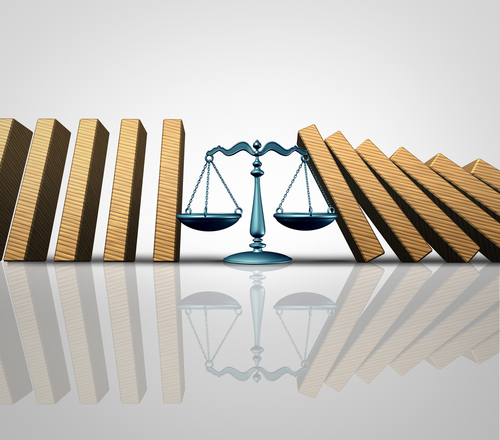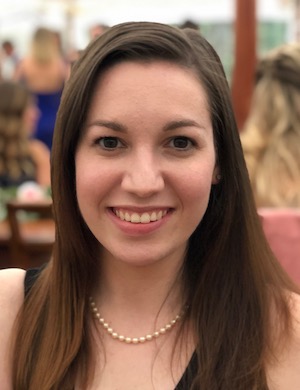Pro bono inspired a survivor of domestic violence to go to law school

Image from Shutterstock.com.
The first attorney I met in earnest was David Emer. He was a litigation associate at the corporate firm Nutter, McClennen & Fish in Boston. At the time, I didn't know what that meant. Up to that point, the privileges I lucked into had insulated me from the realities of the legal system. The idea that I might ever find myself in a position to need an attorney had never crossed my mind.
But at 21 years old, I found myself in the unexpected situation of seeking a restraining order against an ex-boyfriend who had abused and sexually assaulted me. I needed help that, as a college student on full financial aid, I couldn’t afford. That was where David came in. Through, Victim Rights Law Center, a nonprofit that provides legal services for survivors of sexual assault, he agreed to represent me pro bono at a hearing for the restraining order.
I’m writing this from a place neither David nor I would have likely predicted when we met almost five years ago. Tonight, I’m holed up in my law school library, laptop wedged among my casebooks, job applications and journal articles overdue for review. As a third-year law student, I run a constant mental countdown of weeks to finals, weeks to graduation, weeks to the bar exam, weeks to test results, weeks until I can say I am someone I never would have been if not for David, an attorney.
This week, I’m pausing the countdown for a moment of gratitude and reflection. As signs announcing the National Celebration of Pro Bono shout across my law school’s rotunda, I am reminded of a message that I want to share with all of my fellow law students and with the attorneys I hope to work alongside as colleagues in the future: Pro bono service has the power to change the course of clients’ lives. I know because someone’s decision to take on a pro bono case changed mine.
The need for and benefits of pro bono work are, to a degree, screamingly obvious. It’s no secret to anyone in our profession that, especially among those living in poverty, civil legal needs are largely unmet. A recent report stated that more than 80% of civil legal problems reported by low-income Americans received inadequate legal help. Though it is imperative that we make structural change to increase access to low-cost civil legal services, pro bono attorneys fill some of that gap in the meantime. Attorneys working pro bono can ensure fairer, more just outcomes for clients seeking a restraining orders, facing eviction or fighting for custody of their children.
 Alyssa Leader. Photo by Katrina Langer.
Alyssa Leader. Photo by Katrina Langer.
But based on my own experience, I am convinced that pro bono attorneys play a role far beyond improving legal outcomes. Thoughtful, accessible counsel can make a difference in clients’ lives far beyond a successful day in court. David put in countless hours of work on my case, and in the end, he was successful in helping me to get the protective order that I desperately needed. But looking back, that is never the first thing I remember about my experience as his client.
David was the first person to show me that I was worth fighting for. It is hard to explain to someone who has not experienced abuse just how much it is an insidious, nasty thing that can twist into the brain. But suffice it to say, before I met David, I largely believed that the circumstances I faced were my own fault. When I sought out support, my worst fears were confirmed. People I trusted to help met my story with questions: Why I had waited so long to come forward? What I had done that led to such a situation? How did I expect anyone to help anyway?
So, I was confused—suspicious, even—when David told me that he would be unconditionally in my corner. But sure enough, he held to his promise. He never blamed me for what I had been through or how I reacted, even when I blamed myself. When I faltered or expressed uncertainty, he remained patient as I found my way forward. While I struggled to see myself worthy of help at all, he saw my worth as a foregone conclusion. He seemed to believe so fiercely in my worthiness, in fact, that I started to believe in it myself.
As I began the process of healing from violence, the impact of David’s work on my life became clear. Having a restraining order helped me move forward knowing that I would be safe. But in the long term, knowing that someone had heard and believed me made all the difference. The hope that I could provide the same service to someone else was the reason I eventually decided to go to law school and to pursue a career helping people to face the very same challenges that David helped me to overcome.
Today, I’m fortunate to still be in touch with David. Periodically, I’ll email him updates on life and law school. He sends pictures of his baby girl, and I return pictures of my dog. One of the proudest days of my life came recently, when I emailed David to tell him that, as a clinic student, I’d represented my very first client: a survivor of domestic violence in need of pro bono assistance in a restraining order hearing.
As I look forward to graduation and a career in the law, I am thinking a lot about who I want to be as an attorney and as a professional. Broadly, I know that I want to follow David’s example. I want to leverage my power and privilege as an attorney to affirm others’ humanity. I know if I can do a fraction of what David did for me for one client, I will be making a positive difference.
I believe that as students and attorneys, this can be all of our callings. After all, as important a role as David played in my life, what he did was in many ways not extraordinary. He saw a legal need, and he showed up to earnestly, fiercely serve. Pro bono service provides an opportunity for all of us, regardless of field or background, to do this. While we can’t always control our cases’ outcomes, we can show up for those in need in this way and know that we’re truly using our powers for good.
The author would like to extend her most heartfelt thanks to David Emer; Nutter, McClennen & Fish; and Victim Rights Law Center.
See also:
ABAJournal.com: “Looking to volunteer? National Celebration of Pro Bono is next week”
ABAJournal.com: “Do you or your firm have activities planned for the National Celebration of Pro Bono?”
Alyssa Leader is a third-year law student at the University of North Carolina. She currently resides in Chapel Hill with her dog and her partner. After graduation, she hopes to pursue a career providing much-needed civil legal services to survivors of sexual and domestic violence. You can follow her on Twitter @alittleleader for more thoughts related to service, law school and fiercely doing good.
ABAJournal.com is accepting queries for original, thoughtful, nonpromotional articles and commentary by unpaid contributors to run in the Your Voice section. Details and submission guidelines are posted at “Your Submissions, Your Voice.”
Your Voice submissions

The ABA Journal wants to host and facilitate conversations among lawyers about their profession. We are now accepting thoughtful, non-promotional articles and commentary by unpaid contributors.

